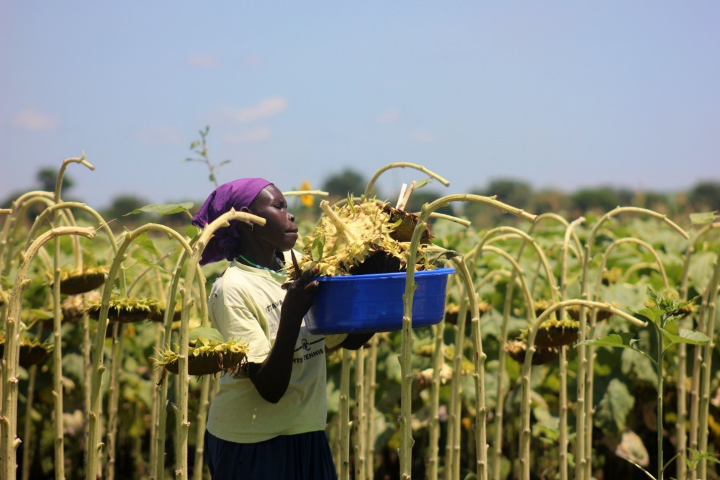World Refugee Day: Inclusive Integration for Refugee Populations in Uganda and Colombia
Inclusive Integration for Refugee Populations in Uganda and Colombia:
Beyond moral, ethical, and humanitarian obligations, integrating refugees into host communities also promotes peaceful social cohesion, cultural enrichment, and economic growth. In Uganda and in Colombia, GOPA Consulting Group companies are making significant strides in helping integrate refugee communities into host societies.

[Photo: Rose Jaguru Mogga harvesting sunflowers. Credit: GOPA AFC.]
Building agricultural business skills in Uganda
Uganda, hosting over 1.5 million refugees primarily from South Sudan, the Democratic Republic of the Congo, Burundi, and Somalia, is one of the largest refugee-hosting countries in the world. Most refugees there live in settlements in the north-west part of the country, and over 80% of them are women and young people under 18 years of age. There, GOPA AFC works to promote their integration through small-scale agricultural production.
“Refugee work usually falls in the category of humanitarian relief, but our project sits at the intersection of emergency relief and economic development,” says Matthias Webendoerfer, Project Manager at GOPA AFC. Financed by the German government and implemented by GIZ and GOPA, the project Response to increased demand on government services and creation of economic opportunities in Uganda (RISE) provides in-kind contributions such as seeds and small ruminants, along with training in agricultural practices, entrepreneurship, and business skills. “I learned how to plant my crop in lines, so it was easier for me to weed and manage quantities. Just looking at my sunflower garden, I see money!” says Rose Jaguru Mogga, a 38-year-old mother of five originally from South Sudan who started growing sunflowers after attending a village sensitization meeting by the RISE-AFC field team. The project’s unique 50/50 split of beneficiaries between refugees and host community members helps prevent conflict between in the areas where it operates – the districts of Arua, Moyo and Adjumani.
Also unique to the project is its process of utilizing existing village savings and loans associations (VSLAs) mechanisms to provide training and to utilize funds for attending trade fairs and investing in members’ agricultural businesses. As a result, 4,000 refugees and persons from host communities, including 2,000 women and 3,000 youth, participated in learning groups realized by the project and increased their income from the sale of agricultural production by an average of 30%. The project’s market-oriented approaches not only help increase food security but also help build business and entrepreneurial skills among refugee and host populations, promoting economic growth alongside cohesion and peaceful integration.
Overcoming barriers to integration in Colombia
Despite integration efforts, the over 1.8 million Venezuelan refugees presently in Colombia continue to face discrimination, labor market barriers, and limited access to education and healthcare. The Bogotá Initiative 2.0, funded by the German Federal Ministry for Economic Cooperation and Development and implemented by GOPA Worldwide Consultants, targets the social and economic integration of migrants, refugees, internally displaced persons, and host communities, focusing on women, youth, and the LGBTQIA+ population in Bogotá.
Marking the first collaboration between the German government and municipal-level governments in Colombia, the project alleviates strain on local resources and services by enhancing social integration and institutional capacity. It has trained 1,462 public officials on providing inclusive services, implemented two health care projects to provide contraception and reproductive health services and to prevent and treat STDs, and guided 1,670 individuals, including 1,143 women and 108 LGBTQIA+ persons, through employability and entrepreneurship programs. As a result, nearly half of participants secured formal employment or started businesses.
The project built a team of experts in economic integration, health, vocational development, and others, who are local to the region. These experts partner with local organizations through small grants disbursed by the project to organize the training sessions and ensure that the local organization partners also benefit from capacity building. This format helps the project reach the maximum number of beneficiaries while establishing lasting capacity within existing local structures.
Harnessing the potential of refugee communities for a more resilient world
From providing psychosocial support to refugees in South Sudan to improving water and sanitation services in the Democratic Republic of the Congo, GOPA Consulting Group companies have undertaken over a dozen other projects around the world to support refugee populations. By focusing on integration of refugee populations into host communities alongside ensuring their access to basic needs, international aid and development actors can help build societies that thrive culturally, enjoy economic growth, and become stronger and more resilient.
